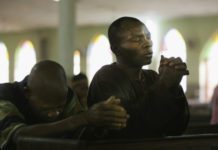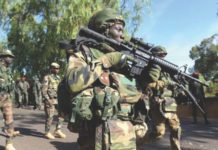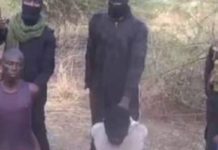By BosNewsLife Africa Service with reporting by BosNewsLife’s Stefan J. Bos

KHARTOUM, SUDAN (BosNewsLife)– Christians in Sudan and newly created South Sudan face possible detention, beatings and even death amid a “deteriorating humanitarian situation” with thousands of people being killed this year alone, aid workers and Christians said in statements obtained by BosNewsLife Sunday, January 22.
“Jonglei State in South Sudan…severe inter-tribal warfare has caused an estimated 3,000 deaths and displaced over 100,000 people in the last two weeks,” reported Christian Solidarity Worldwide (CSW), which has been investigating the situation.
The region was reportedly a disaster zone by President Salva Kiir. “Tensions over cattle-raiding are common between tribal groups, However the violence in Jonglei constitutes the worst internal violence since South Sudan gained its independence,” from Sudan in July 2011, CSW added.
The troubles have been linked to religious tensions, with Sudan known as mainly Muslim and Arabic-speaking, while South Sudan is more indigenously African in race, culture, and religion, with Christian influences and a perceived Western orientation.
Amid the chaos, Christians are fleeing. That is also the case in the contested region of Abey, which has been viewed as being occupied by the forces of neighboring Sudan, since May 2011.
“PEOPLE SUFFERING”
In published remarks, Zechariah Bol Deng, a senior elder of the Ngok Dinka tribe who are resident in Abyei, said, “Currently, people are still suffering, there are thousands living under trees near the river, unable to return to their homes due to the presence of the SAF in Abyei, and with very limited resources.”
He added that the presence of the Sudanese army “means that people are afraid to return to Abyei, and their situation is getting more and more desperate. Children are dying of preventable diseases and only a limited number of relief agencies are able to reach them.”
CSW said that attempts at finding a political solution were halted in May 2011, when the Sudan’s troops took “the area by force.” At least 130,000 Ngok Dinka residents fled the fighting, including Christians, the majority of whom are still unable to return to their homes, according to rights investigators.
In Sudan’s capital Kharthoum, minority Christians have also been pressured to leave the country towards South Sudan, with reports of detentions and beatings, church leaders said.
Among those briefly detained in recent days was evangelist James Kat of the Evangelical Church of Sudan with officers allegedly beating him as they took him to a North Division police station. Kat, who lives at the church site, was reportedly arrested for using the site as his home. He was freed the same day, January 17, but uncertainty remains as he was released on bail, Christians said.
MUSLIM “BIAS”
The previous say another church leader was arrested Monday, January 16, in a Sudanese Presbyterian Evangelical Church church property dispute in which police and courts “have been unjustly biased in favor of Muslims,” Christian leaders said.
Officers arrested Gabro Haile Selassie, as he lives on the church property that has been transferred to a Muslim businessman in a disputed agreement. In published remarks Selassie, who was released on bail after a few hours, said he fears being arrested again and that police already started demolishing the church compound fence.
There was no immediate comment from Sudanese officials.
The tensions have overshadowed attempts by international organizations to help stabilize both Sudan and South Sudan. Two rounds of north-south civil war cost the lives of 1.5 million people, and a continuing conflict in the western region of Darfur has driven two million people from their homes and killed more than 200,000, according to several estimates.
Open Doors, another advocacy group investigating the situation, has warned that the tensions could add to persecution faced by Christians in the region.









Conflicts in Sudan has got nothing to do with religions, it’s all about Power, Resources distributions and other historical tribal/discrimination issues, therefore, involving believes it’s not going to solve the problems.